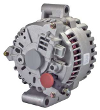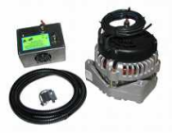|
|
High Output Alternators, Ford type,
GM type,
Dodge/ Chrysler type
What is an alternator and how does it work?
An alternator
is a device that converts mechanical energy
into electrical energy
. In automotive applications an internal combustion motor
is used as your initial energy source. In power generation
for your home other energy sources can be used such as impounding
water
in hydro electric dam
power generation. Water is also used to make steam to power the alternator such as in nuclear power
or natural gas fired operations as well. Many big cities have "Waste to Energy
" which are large incinerators
that burn trash
to make steam
to turn large turbines
which in the end turn an alternator.
No matter how they power the alternator they are usually all the same. Alternator are made up of two magnetic fields
, the outer fields which is called the stator
, you can usually see the stator winding through the cooling holes in your alternator. And you have your inner
field which is called the rotor
. When the rotor field spins inside of the stator field this reaction
of the two fields breaking what they call the flux lines of magnetism
causes power to be induced
into the stator in the form of AC current
. Alternators for cars
or for large power generation plants are all three phase AC
with the exception that some marine, motorcycle
, atv
applications use only single phase
although some use three phase. All alternators make AC (Alternating Current). In power generation for homes the
power stays AC and is sent out to homes and factories In vehicle applications the AC current is converted to DC (Direct Current)
by the use of diodes
in what is called the BRIDGE
RECTIFIER
. The Bridge Rectifier has Diodes which are one way gates that allow power
to flow in only one direction. Thereby converting AC current to DC current. In power generation for homes they control the current
by turning the alternator at constant speed
. In automotive applications where the motor runs at different speeds they use a VOLTAGE
REGULATOR
which varies the power to the center rotor. If the voltage regulator sees that the alternator is turning slow or the vehicle needs more power it sends more power to the rotor making it a large electromagnet
which makes the alternator produce more
power. If your battery
fills up or the vehicle
doesn't need as much power the voltage regulator reduces the power sent to the rotor making it as small electromagnet making the alternator produce less power.
"This place has over 40 years experience
in the auto electric business, www.AlternatorParts.com
|
|



